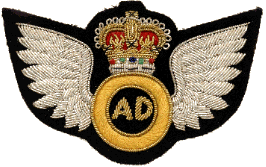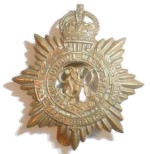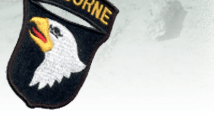Arthur Holmes - Air Despatcher
Arthur was part of the 398th Company RASC.
 In the night of June the 6th to the 7th operation "Rob Roy" was started. 46th Group or the RAF was stationed on the airfields Baker Farm, Broadwel and Down Ampney. The 6th Airborne division had landed in Normandy the night before and although elements of the sea borne forced had linked up with the paratroopers, their supplies where still thin and it was very important to get as much supplies as possible to the paratroopers. Fifty Dakotas of the 46th group took of in the night. In the night of June the 6th to the 7th operation "Rob Roy" was started. 46th Group or the RAF was stationed on the airfields Baker Farm, Broadwel and Down Ampney. The 6th Airborne division had landed in Normandy the night before and although elements of the sea borne forced had linked up with the paratroopers, their supplies where still thin and it was very important to get as much supplies as possible to the paratroopers. Fifty Dakotas of the 46th group took of in the night.
Arthur was in one of the C47s that took off from Baker Farm. Each C47 carried a crew of eight men, four from the RAF who flew the aircraft and four soldiers who were air dispatchers.
The C47s that where used for air despatching where stripped of seats etc. The doors where also completely taken off. The dispatchers wore gym slippers as army boots were dangerous. The man that was actually at the door, giving the last push to the panniers had a restraining harness to stop him from falling out of the doorway. In war conditions the aircraft was not on an even keel and getting rid of the load could be hard physical work.
The four air dispatchers (one NCO and three soldiers) had spent the day driving a three ton lorry travelling around various supply dumps collecting their load. Arthurs load consited of rations. He was glad it was not petrol or ammunition as this would be a much saver load when the flak would come up.
Arhtur recalls:
 "After a day collecting, we proceeded to Blakehill Farm Airfield and spent the evening loading the rations into the panniers, attaching the parachutes, and loading them onto the aircraft and attaching them to the static lines. After all this we had supper, and I believe we took off after dark. We flew across the channel and crossed the Normandy coast, where the flak rose. We were hit and one of the engines caught fire and there was other damage to the aircraft as well. We hadn't had the time to drop our load. We had been fired upon by 'friendly' fire on our way to the drop zone. "After a day collecting, we proceeded to Blakehill Farm Airfield and spent the evening loading the rations into the panniers, attaching the parachutes, and loading them onto the aircraft and attaching them to the static lines. After all this we had supper, and I believe we took off after dark. We flew across the channel and crossed the Normandy coast, where the flak rose. We were hit and one of the engines caught fire and there was other damage to the aircraft as well. We hadn't had the time to drop our load. We had been fired upon by 'friendly' fire on our way to the drop zone.
Our pilot made a skilful landing, but when we hit the ground there was carnage. The plane was on fire and I remember pulling a member of the aircrew out with very severe burns. I myself had leg and shoulder injuries. As some of us where in a bad state, the senior officer present ordered that we stay with the aircraft; this meant that within an hour German soldiers arrived in a half track and after stealing our watches and other valuables, took us prisoner.
Of the 50 Dakotas that had left Great Britain that night 5 would not return due to friendly fire.
 We where taken to a school at a place called San Pierre where we stayed the night. The next day, those of us who could walk were taken by lorry to a hospital at Rennes, where we received much needed medical and surgical attention. I remember that while in Rennes Hospital I helped to spoon feed two American airmen who were so severely burnt that they where helpless. After some days I was moved to a camp nearby and placed in solitary confinement and closely questioned by some unpleasant German SS officers. It sticks in my mind to this day that for some obscure reason, during the interrogation, the Germans and I had a bitter argument about cruelty to animals in Great Britain. We where taken to a school at a place called San Pierre where we stayed the night. The next day, those of us who could walk were taken by lorry to a hospital at Rennes, where we received much needed medical and surgical attention. I remember that while in Rennes Hospital I helped to spoon feed two American airmen who were so severely burnt that they where helpless. After some days I was moved to a camp nearby and placed in solitary confinement and closely questioned by some unpleasant German SS officers. It sticks in my mind to this day that for some obscure reason, during the interrogation, the Germans and I had a bitter argument about cruelty to animals in Great Britain.
Perhaps, in the circumstances, my life was saved when Rennes was attacked by the American Army and as the shells fell, those in solitary confinement were moved, separately from the rest of the camp, to the railway station for transport away. During the ensuing confusion another British soldier and I managed to get away from the confinement group and got lost among the other prisoners.
 Later, I and many others where transported by cattle trucks via Chalons, Tours, Trier and Muhlberg ending up in what is now Czech Republic in a working party. Eventually, in May 1945 a few of us ended up by mistake in Terezin concentration camp and learnt the full horror of war. The advancing Soviet Army arrived at Terezin and kindly gave us a lorry, petrol and a huge Soviet flag, (for our safety) and we travelled via Prague to Pilzen and the American Army; then home by C47 and Lancaster. The last time I ever flew. Later, I and many others where transported by cattle trucks via Chalons, Tours, Trier and Muhlberg ending up in what is now Czech Republic in a working party. Eventually, in May 1945 a few of us ended up by mistake in Terezin concentration camp and learnt the full horror of war. The advancing Soviet Army arrived at Terezin and kindly gave us a lorry, petrol and a huge Soviet flag, (for our safety) and we travelled via Prague to Pilzen and the American Army; then home by C47 and Lancaster. The last time I ever flew.
|

 In the night of June the 6th to the 7th operation "Rob Roy" was started. 46th Group or the RAF was stationed on the airfields Baker Farm, Broadwel and Down Ampney. The 6th Airborne division had landed in Normandy the night before and although elements of the sea borne forced had linked up with the paratroopers, their supplies where still thin and it was very important to get as much supplies as possible to the paratroopers. Fifty Dakotas of the 46th group took of in the night.
In the night of June the 6th to the 7th operation "Rob Roy" was started. 46th Group or the RAF was stationed on the airfields Baker Farm, Broadwel and Down Ampney. The 6th Airborne division had landed in Normandy the night before and although elements of the sea borne forced had linked up with the paratroopers, their supplies where still thin and it was very important to get as much supplies as possible to the paratroopers. Fifty Dakotas of the 46th group took of in the night.
 "After a day collecting, we proceeded to Blakehill Farm Airfield and spent the evening loading the rations into the panniers, attaching the parachutes, and loading them onto the aircraft and attaching them to the static lines. After all this we had supper, and I believe we took off after dark. We flew across the channel and crossed the Normandy coast, where the flak rose. We were hit and one of the engines caught fire and there was other damage to the aircraft as well. We hadn't had the time to drop our load. We had been fired upon by 'friendly' fire on our way to the drop zone.
"After a day collecting, we proceeded to Blakehill Farm Airfield and spent the evening loading the rations into the panniers, attaching the parachutes, and loading them onto the aircraft and attaching them to the static lines. After all this we had supper, and I believe we took off after dark. We flew across the channel and crossed the Normandy coast, where the flak rose. We were hit and one of the engines caught fire and there was other damage to the aircraft as well. We hadn't had the time to drop our load. We had been fired upon by 'friendly' fire on our way to the drop zone.
 We where taken to a school at a place called San Pierre where we stayed the night. The next day, those of us who could walk were taken by lorry to a hospital at Rennes, where we received much needed medical and surgical attention. I remember that while in Rennes Hospital I helped to spoon feed two American airmen who were so severely burnt that they where helpless. After some days I was moved to a camp nearby and placed in solitary confinement and closely questioned by some unpleasant German SS officers. It sticks in my mind to this day that for some obscure reason, during the interrogation, the Germans and I had a bitter argument about cruelty to animals in Great Britain.
We where taken to a school at a place called San Pierre where we stayed the night. The next day, those of us who could walk were taken by lorry to a hospital at Rennes, where we received much needed medical and surgical attention. I remember that while in Rennes Hospital I helped to spoon feed two American airmen who were so severely burnt that they where helpless. After some days I was moved to a camp nearby and placed in solitary confinement and closely questioned by some unpleasant German SS officers. It sticks in my mind to this day that for some obscure reason, during the interrogation, the Germans and I had a bitter argument about cruelty to animals in Great Britain.
 Later, I and many others where transported by cattle trucks via Chalons, Tours, Trier and Muhlberg ending up in what is now Czech Republic in a working party. Eventually, in May 1945 a few of us ended up by mistake in Terezin concentration camp and learnt the full horror of war. The advancing Soviet Army arrived at Terezin and kindly gave us a lorry, petrol and a huge Soviet flag, (for our safety) and we travelled via Prague to Pilzen and the American Army; then home by C47 and Lancaster. The last time I ever flew.
Later, I and many others where transported by cattle trucks via Chalons, Tours, Trier and Muhlberg ending up in what is now Czech Republic in a working party. Eventually, in May 1945 a few of us ended up by mistake in Terezin concentration camp and learnt the full horror of war. The advancing Soviet Army arrived at Terezin and kindly gave us a lorry, petrol and a huge Soviet flag, (for our safety) and we travelled via Prague to Pilzen and the American Army; then home by C47 and Lancaster. The last time I ever flew.